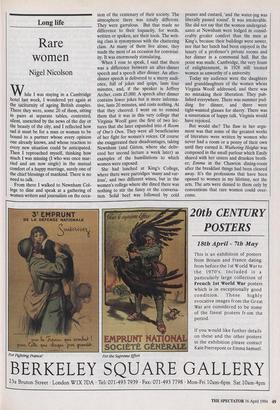Long life
Rare women
Nigel Nicolson
hile I was staying in a Cambridge hotel last week, I wondered yet again at the taciturnity of ageing British couples. There they were, some 20 of them, sitting in pairs at separate tables, contented, silent, unexcited by the news of the day or the beauty of the city, and I reflected how sad it must be for a man or woman to be bound to a partner whose every opinion one already knows, and whose reaction to every new situation could be anticipated. Then I reproached myself, thinking how much I was missing (I who was once mar- ried and am now single) in the mutual comfort of a happy marriage, surely one of the chief blessings of mankind. There is no need to talk.
From there I walked to Newnham Col- lege to dine and speak at a gathering of women writers and journalists on the occa- sion of the centenary of their society. The atmosphere there was totally different. They were garrulous. But that made no difference to their loquacity, for words, written or spoken, are their tools. The writ- ing class is synonymous with the chattering class. As many of them live alone, they made the most of an occasion for convivial- ity. It was enormously stimulating.
When I rose to speak, I said that there was a difference between an after-dinner speech and a speech after dinner. An after- dinner speech is delivered to a merry audi- ence, full of jokes and quips, lasts four minutes, and, if the speaker is Jeffrey Archer, costs £5,000. A speech after dinner contains fewer jokes but is more informa- tive, lasts 20 minutes, and costs nothing. At that they cheered. I went on to remind them that it was in this very college that Virginia Woolf gave the first of two lec- tures that she later expanded into A Room of One's Own. They were all beneficiaries of her fight for women's voices. Of course she exaggerated their disadvantages, taking Newnham (and Girton, where she deliv- ered her second lecture a week later) as examples of the humiliations to which women were exposed.
She had lunched at King's College, where there were partridges 'many and var- ious', and two different wines, but in the women's college where she dined there was nothing to stir the fancy or the conversa- tion. Solid beef was followed by cold prunes and custard, 'and the water-jug was liberally passed round'. It was intolerable. She did not say that the women undergrad- uates at Newnham were lodged in consid- erably greater comfort than the men at King's, because their buildings were newer, nor that her lunch had been enjoyed in the luxury of a professor's private rooms and her dinner in a communal hall. But the point was made. Cambridge, the very fount of enlightenment, in 1928 still treated women as unworthy of a university.
Today my audience were the daughters and granddaughters of the women whom Virginia Woolf addressed, and there was no mistaking their liberation. They pub- lished everywhere. There was summer pud- ding for dinner, and there were tight-waisted glasses for sherry. There was a susurration of happy talk. Virginia would have rejoiced.
But would she? The flaw in her argu- ment was that some of the greatest works of literature were written by women who never had a room or a penny of their own until they earned it. Wuthering Heights was composed in the small parlour which Emily shared with her sisters and drunken broth- er; Emma in the Chawton dining-room after the breakfast things had been cleared away. It's the professions that have been opened to women in my lifetime, not the arts. The arts were denied to them only by conventions that rare women could over- come.


























































 Previous page
Previous page